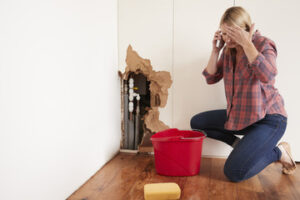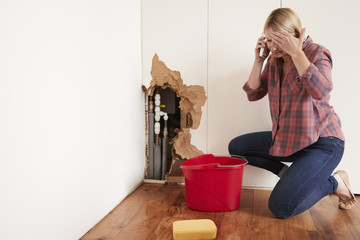Water Damage can cause a variety of losses to property. Apart from the usual rotting of wood, it can also grow bacteria and mold. These can cause various health problems for the people living in the home. Hence, it is necessary to hire a professional to restore the property and prevent further damage.
 Cleaning up water damage is difficult and requires an expert’s assistance. The first step is to get the property inspected by an expert. Make sure the inspector makes a note of the water damage. Next, get at least three or four estimates for the water damage repair. These estimates will be useful when negotiating with the seller. A CMA report should accompany water damage restoration so the buyer can better understand the property’s worth.
Cleaning up water damage is difficult and requires an expert’s assistance. The first step is to get the property inspected by an expert. Make sure the inspector makes a note of the water damage. Next, get at least three or four estimates for the water damage repair. These estimates will be useful when negotiating with the seller. A CMA report should accompany water damage restoration so the buyer can better understand the property’s worth.
After the insurance company has assessed the damage, the next step is to file a claim. The insurance company will want to see evidence that the water damage was caused by water or flood. Hence, taking multiple photographs of the property and videotapes is crucial to prove that the damage was caused by water.
It is essential to act quickly. Water damage can cause damage to building materials, fixtures, and electronics. It also causes mold growth, which can pose health concerns. You should therefore contact a water damage restoration company as soon as possible. This will help you recover your property as quickly as possible. And, in case of hidden damage, it is important to report it to the insurance company so that they can help you assess the damage and take the necessary measures to restore it.
A broken water pipe can cause water damage, washing machine overflow or leakage, a broken or leaking pipe, a clogged toilet, or a broken dishwasher hose. The damage can also be caused by flooding or seepage of groundwater. Moreover, water damage can also result from the failure of the building envelope. Even a small leak in a pipe can lead to serious property loss. It can also impact the electrical system and the structure.
The most important thing is to know your insurance policy. Water damage can be prevented by ensuring that your property is well-maintained. In addition, water damage insurance will cover damages caused by various events. You should always check your flood insurance policy to know if it covers flood damage. You should also check your homeowner’s insurance policy to know what it covers.
Water damage is one of the most common reasons for home insurance. Almost everyone will experience water damage at some point. The extent of the damage will depend on how quickly you are able to find the source of water. The sooner you address the problem, the less costly it will be. Once you have an insurance policy, it will cover the cost of the repairs.
If the cause of the water damage is unclear, it is important to check your homeowner’s insurance policy. Many homeowners insurance policies don’t cover water damage. They may even exclude the cost of water damage restoration. For example, if a slow, constant leak is the culprit, a home insurance adjuster will deny coverage for that particular event.
The health risks associated with water damage are very real. Untreated water damage can result in dangerous bacteria and mold growth. This can damage the structure of the home and the contents inside. Mold can also lead to respiratory illnesses. Young children and the elderly are more vulnerable to these illnesses. Furthermore, untreated water damage can cause unsightly smells, making it unsanitary and uncomfortable for guests.
The first step in water damage restoration is to dry out the home. While this can be challenging when the electricity has been shut off, it’s important to begin drying the property. The drying process can sometimes take weeks or even months, depending on the extent of water damage. Regardless of the size of the water damage, it is vital to start the drying process as soon as possible to prevent mold growth. Once mold has started growing, it can spread rapidly to other home parts.

